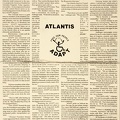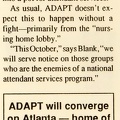Different TIMES, September 24, 1990, p. 6
ADAPT fights for attendant services
(Reprinted with permission from the Disability Rag; Box 145; Louisville, KY 40201.)
[This story continues on 623 but the text is included here in full, for ease of reading.]
“People with disabilities have the civil and human right to dependable attendant services that meet our daily needs in the location and manner of our choice."
This simple declaration, made in Denver this summer, signaled the offensive being launched by ADAPT against “the nursing home lobby feeding off peoples' lives."
It's ironic, says ADAPT member Mark Johnson. "Here we've finally got our rights now, in a law, and here you have more and more severely disabled people wanting to kill themselves—literally kill themselves—because they're being forced into nursing homes."
“That Ken Bergstedt in Nevada [who petitioned the court in May to disconnect his respirator] is literally saying, “l'll end my life before I'll go in a nursing home," Johnson said.
“What do you expect when people only have institutionalization to look forward to?" adds actress Nancy Becker Kennedy, one of the group that conducted a hunger strike in Los Angeles in July to protest the cut of California’s In Home Supportive Services. “Their attempts to stay in their homes are thwarted."
lt’s the same with Georgia's highly publicized Larry McAfee, who was just put into a “group home," says ADAPT. Even after all the publicity, the State of Georgia will not put any money into funding attendant services in one's own home. And ADAPT is fed up.
Recalling the phrase the transit industry used to argue that each city should decide whether or not to put lifts on buses, ADAPT calls the patchwork system of funding in-home services “the old ‘local option’ stuff all over again."
“We're sick of it,"says Johnson. There needs to be a national commitment.
In California, activists battled for several months to restore their In Home Support Services program which had been entirely cut from the state budget—and succeeded only in restoring it to its former level, which allows a disabled person to hire an attendant only at minimum wage and for no more than eight hours a day.
People who need an attendant around the clock, like Ken Bergstedt, have little hope of avoiding a nursing home even in California, often cited as the state with the best attendant services program in the nation.
Yet such battles sap the energy of disability activists for the larger fight for a national commitment. ADAPT has modified its former name, “American Disabled for Accessible Public Transportation" to “American Disabled for Attendant Programs Today" to reflect its new focus.
ADAPT says attendant services are a right.
The group wants the program it's calling for to make attendant services available "based on functional need" rather than “whether a person can work or not." They don't want "employability" to be a "condition for getting services. And they don't want eligibility based on any specific disability, as it is in many states now.
They want it to be available “to people of all ages, 24 hours a day, seven days a week, with back-up emergency services."They stress they're not asking for “someone to hold your hand" but are speaking of the realistic needs of people like McAfee, Rick Tauscher, and Bergstedt who need an attendant available around the clock.
They also say a program that allows the disabled person maximum control over an attendant is mandatory. Maybe a disabled person won’t want that control; maybe they'll want someone else to handle the paperwork and hiring decisions. That should be the disabled person‘s option, they say. There’s a quality-control issue here, they insist; they want to make sure disabled people get quality care but are allowed maximum say over personal services they receive—which is all too often not the case today as home "health" agencies muscle their way into the home "care" field.
They‘re sick of the word “care.”
They want a program that doesn’t keep anyone from services because they make too much money; they're willing, they say, to deal with a sliding scale for fees for such a program; but they want it available to anyone who needs it—regardless of income.
It's a right, and cost is simply not an issue, they say. Keeping disabled people in institutions is ludicrously more expensive than providing in-home services in this country today. They blame that lack for the problems Larry MeAfee's constantly found himself in; they blame the nursing home industry for siphoning off the money that could go to fund such services. And they charge that home health agencies are nothing more than “the new nursing homes."
Home health agencies “take people on Medicare and give them services and then bill them for $60 a pop," says ADAPT organizer Wade Blank. “Then when their Medicare coverage runs out after six months, they drop ‘em."
The group says it’s also targeting “the big insurance companies like Prudential" and health maintenance organizations, who they say have a vested interest in keeping the system like it is.
“We're saying that ethically and morally, nursing homes are not the place to go," says Blank.
“When I see my severely disabled friends, living in their own homes, when l visit them in their apartments, listen with them to records or order in a pizza—and then I see my friends living in nursing homes, wasting away, waiting to die, I get very, very angry,” said Southern California ADAPT member Lilibeth Navarro.
A survey of ADAPT members through their newsletter, Incitement, led them to decide to shift the focus to attendant services, said Navarro. And they're emphatic about the term too. “It’s not ‘attendant care‘ anymore," said Blank. “Whenever anybody said ‘care’ everybody booed,“ he added.
It is fitting that ADAPT, whose original members came from Denver‘s Atlantis Community, will focus on attendant services. It was that need which led to the start of Atlantis, a “community” of disabled people and attendants. Atlantis “has a neat system,"agrees Navarro, noting that the 24-hour rotary attendant services allows any Atlantis person to have an attendant available whenever it's needed. “We could call an attendant at 11:30 p.m. and have somebody here," she said. “People who are having trouble with attendants can call and get an emergency back-up."
Navarro, like others, said she knew of people “who endured abuse because they were afraid to lose their attendant"—"because it's so hard to find somebody, and nobody to turn to in an emergency situation." She related the story of a man whose attendant simply walked out on him and left him, unable even to reach a phone, for four days. “If his father hadn't checked on him, he'd be dead."
“Only a national attendant program," she stressed, “will free us from emotional slavery Nancy Becker Kennedy agreed with Navarro. “The linchpin for independent living is in-home attendant services. It’s humane; it gives us a future."
The group has sent a letter to Health and Human Services Secretary Louis Sullivan demanding a meeting in Atlanta Oct. 1; they've given Sullivan until Aug. 15 to reply.
ADAPT activists from around the nation will descend on Atlanta the first week of October to launch the fight. They’ll be calling for a quarter of the money now going to the nursing home industry to “go into a pot for attendant services."
As usual, ADAPT doesn’t expect this to happen without a fight -- primarily from the “nursing home lobby.”
“This October," says Blank, “we will serve notice on those groups who are the enemies of a national attendant services program."
TEXT BOX:
ADAPT will converge on Atlanta — home of Morehouse College, HHS Secretary Louis Sullivan’s alma mater — on Sept. 28 for week-long direct action protest and training. Nationally known organizer Shel Trapp will conduct the session Saturday, Sept. 29.
For more information on travel and hotel arrangements, contact ADAPT in Denver at (303) 936-1110.
— Reprinted with permission from the Disability Rag; Box 145; Louisville, KY 40201.
- Created on
- Friday 12 July 2013
- Posted on
- Thursday 22 October 2015
- Tags
- 100% lift equipped, Access Living, ADAPT - American Disabled for Accessible Public Transportation, ADAPT - American Disabled for Attendant Programs Today, Atlantis Community, attendant services, back up, California, civil rights, Denver, Different TIMES, Disability Rag, functional need, HMOs, home health, human right, in-home services, Incitement, institutionalization, insurance, Ken Bergstedt, Larry McAfee, Lillibeth Navarro, local option, Mark Johnson, Medicaid, Medicare, Nancy Becker Kennedy, nursing homes, Rick Tauscher, Secretary Louis Sullivan, Shel Trapp, suicide, Wade Blank
- Albums
- Visits
- 6043
- Rating score
- no rate
- Rate this photo


0 comments